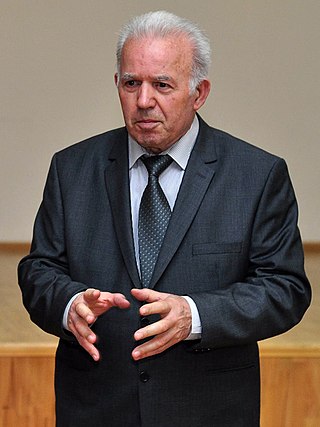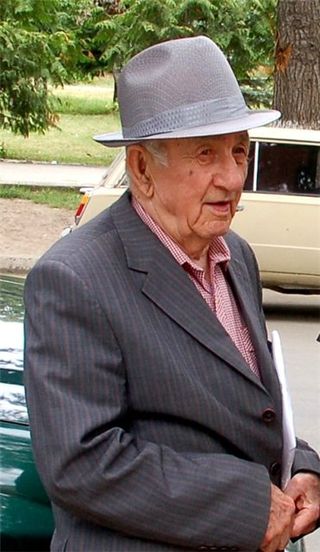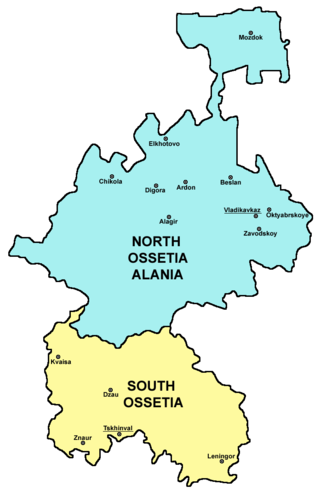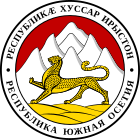Politics in Georgia involve a parliamentary representative democratic republic with a multi-party system. The President of Georgia is the ceremonial head of state and the Prime Minister of Georgia is the head of government. The Prime Minister and the Government wield executive power. Legislative power is vested in both the Government and the unicameral Parliament of Georgia.

South Ossetia, officially the Republic of South Ossetia or the State of Alania, is a partially recognised landlocked state in the South Caucasus. It has an officially stated population of just over 56,500 people (2022), who live in an area of 3,900 square kilometres (1,500 sq mi), with 33,000 living in the capital city, Tskhinvali.

The Georgian–Ossetian conflict is an ethno-political conflict over Georgia's former autonomous region of South Ossetia, which evolved in 1989 and developed into a war. Despite a declared ceasefire and numerous peace efforts, the conflict remained unresolved. In August 2008, military tensions and clashes between Georgia and South Ossetian separatists erupted into the Russo-Georgian War. Since then, South Ossetia has been under Russian occupation.

Lyudvig Alekseyevich Chibirov was the Chairman of the Parliament and later, following inaugural elections the first president of South Ossetia. Born in 1932, Chibirov is a former member of the South Ossetian Parliament. Prior to the elections in 1996, he had been South Ossetia's head of state since 1993. When the post of Chairman of the Parliament was abolished in favor of the presidency, Chibirov became the first occupant of the new office.

The Communist Party of South Ossetia is a communist party in South Ossetia. The party was founded in 1993. As of 2004, the party claimed a membership of 1,500. The party seeks recognition of the Republic of South Ossetia, which is internationally recognized by most countries as a part of Georgia.

The 1991–1992 South Ossetia War was fought between Georgian government forces and ethnic Georgian militias on one side and the forces of South Ossetian separatists and Russia on the other. The war ended with a Dagomys Agreement, signed on 24 June 1992, which established a joint peacekeeping force and left South Ossetia divided between the rival authorities.

Parliamentary elections were held in the Georgian SSR on 28 October 1990, with a second round on 11 November. They were the first free parliamentary election in since 1919 and saw Round Table-Free Georgia emerge as the largest party in Parliament with 155 of the 250 seats. Voter turnout was 70%.

The Parliament of South Ossetia is the unicameral legislature of the partially recognized Republic of South Ossetia. The 34 members of parliament are elected using a mixed system of Party-list proportional representation (17) and single-member districts (17). South Ossetia has a multi-party system, and currently 5 political parties are represented in parliament and has 6 independent MPs elected through single-member districts. The parliament is headed by a speaker, who is elected from among the members. Since 15 september 2022 the speaker of parliament is Alan Alborov, one of the four deputees of the Nykhaz party of president Alan Gagloev, after Alan Tadtaev of United Ossetia was forced to resign.
Gerasim "Rezo" Georgievich Khugayev is an Ossetian politician and former Prime Minister of the Republic of South Ossetia. He is the only South Ossetian Prime Minister to serve more than one time, at this date. He first served from October 1993 until May 1994 under Head of State Lyudvig Chibirov, and then again from December 2001 until August 2003, as the first Prime Minister appointed by President of South Ossetia Eduard Kokoity.

Znaur Nikolayevich Gassiyev was a South Ossetian politician, who was one of the leaders of the South Ossetian independence movement in the early 1990s, which culminated in the 1991–1992 South Ossetia War.

Stanislav Jakovlevich Kochiev is a South Ossetian politician, who is a former presidential candidate and former chairman (speaker) of the Parliament of South Ossetia.

Presidential elections were held in South Ossetia on 10 November 1996. The result was a victory for the incumbent head of state Lyudvig Chibirov, who received 52% of the vote.
South Ossetia is an de facto state, approximately 1,000 metres (3,300 ft) above sea level on the slopes of the Greater Caucasus. Although it declared independence in 2008, only a few countries acknowledge it. The region is inhabited by Ossetians, an Iranian ethnic group. According to Russia, Nicaragua, Venezuela, Syria and Nauru, it is one of the world's newest independent states. All other states and international organisations consider South Ossetia an autonomous region of Georgia, functioning as a de facto state for twenty years after declaring independence and conducting a successful armed rebellion. Its Georgian inhabitants have been displaced. South Ossetia has been a source of tension for a number of years, with Georgia and Russia's political differences impeding peaceful independence and breeding a turbulent series of events which undermine the Universal Declaration of Human Rights.

Presidential elections were held in South Ossetia in 2001. As no candidate received a majority of the vote in the first round on 18 November, a second round was held on 6 December, which was won by Eduard Kokoity, who defeated Stanislav Kochiev. Incumbent president Lyudvig Chibirov was eliminated in the first round mostly due to popular disdain in his economic policies. The elections were boycotted by the Georgian population.

South Ossetia is a partially recognized and Russian-occupied separatist state internationally recognized as part of Georgia. It is mainly inhabited by Ossetians, an ethnic group also dominant in North Ossetia, which is part of Russia. South Ossetia separated itself from Georgia following the 1991–1992 South Ossetia War with the help of Russia, remaining ever since as a state closely allied with this country.

Alan Eduardovich Gagloev, also transliterated as Gagloyev, is a South Ossetian politician and former intelligence officer, who is the fifth and current president of South Ossetia since 2022. He also served as chairman of the Nykhaz party from 2020 to 2023.

Nykhaz is a political party in South Ossetia founded in 2013 by supporters of Independent president Leonid Tibilov. It's members and supporters are referred to as Nykhasovites in local media.

David Georgievich Sanakoev is a South Ossetian war-criminal, politician, diplomat, and international fugitive, who served as Minister of Foreign Affairs of South Ossetia from 2012 to 2015, during the presidency of Leonid Tibilov.

Parliamentary elections were held in South Ossetia on 12 May 1999. They were the third elections in the then unrecognized state since its de facto independence following the First South Ossetia War and the first elections after the territory became a semi-presidential republic with a new constitution ratified on 27 November 1996. Prior to this, South Ossetia had no executive branch of government, and the Speaker of Parliament was the head of state.

Supreme Soviet elections were held in the South Ossetian Autonomous Oblast on 9 December 1990. The disputed elections took place during a period of extreme ethnic unrest in Georgia during the collapse of the Soviet Union. South Ossetia declared independence from Georgia and held elections in response to regional political parties being barred from the 1990 Georgian Supreme Soviet election. In response, Georgia declared martial law, which culminated in the start of the South Ossetian War.














